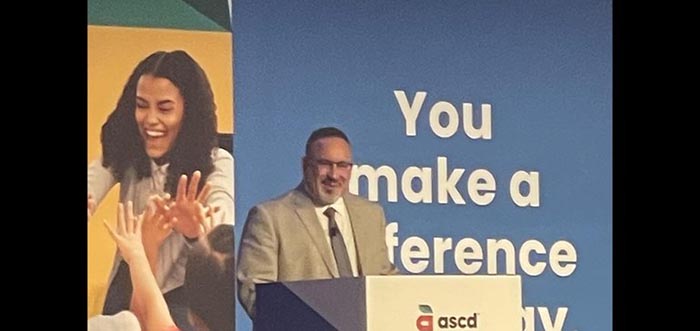
From K-12 Dive
By Anna Merod
March 22, 2022
Dive Brief:
U.S. Secretary of Education Miguel Cardona on Monday said some people are waiting to use assessment data to be released by the U.S. Department of Education this spring as a means to privatize education.
Cardona’s comment came during the closing general session of ASCD’s annual conference in Chicago after Avis Williams, president of the ASCD board of directors, noted the test results will likely show a stark decrease in achievement. Williams said the results could be used to portray schools as failing, and educators as ineffective.
“As secretary of education, I have to do more to make sure that we’re lifting up examples of how we’re using the data well, but also making sure the districts know that the way data is being used … doesn’t support growth, and it’s really just hammering on those folks that are working twice as hard to support students,” Cardona said during the ASCD fireside chat.
Dive Insight:
When Williams, who is superintendent of Selma City Schools in Selma, Alabama, asked Cardona to respond to concerns that student performance data could be used to critique teachers and schools, he upped the ante.
“I want to take it a step further. Some are waiting for that data to then try to create a picture because their plan is to privatize,” Cardona said.
While there’s always tension in education policy, Cardona’s public comment is likely one of the first times a notable federal official has recently and explicitly voiced this concern over using data for school privatization efforts, said Lindsay Dworkin, vice president of policy and advocacy at NWEA, a nonprofit assessment provider, and a former deputy assistant secretary for outreach at the Ed Department.
As politics in education have “heated up” in the past year or so, Dworkin said it’s possible Cardona is reacting to that.
At ASCD, Cardona added that he’s reflected on how the Department of Education could improve its messaging to make sure it’s setting a tone about how to best use testing data, but also how not to use it, noting “the misuse of data has been the bane of our profession sometimes.”
“We have to collectively, as a profession, use the data to spotlight the need, but be wary of where it’s being used as a hammer,” Cardona said. “Because in those places where it’s being used as a hammer, those folks fed kids, those folks knocked on doors, they used their buses to drop off meals where those kids needed it.”
It’s important districts and states use test data for recovery efforts and that messaging points to the future, as well as to the current surplus of federal education relief dollars through the American Rescue Plan, Dworkin said.
“We can’t manage what we don’t measure,” Dworkin said. “To understand which students need support, which programs, which interventions, we’ve got to have data to unpack that, and of course assessment data that reveals information about student growth and student proficiency is, I think, one of the essential ways to do that.”
Cardona has also echoed calls to use ARP funding to address the needs of students and staff following COVID-19’s devastating effect on schools, and he has highlighted its significance and historic availability.
Overall, the data shouldn’t just be used to signal how tough the pandemic has been for students, Dworkin said. Instead, she said data can also be used to shed light on effective programs and interventions as schools recover from COVID-19’s impact.
Data “should not be used to undermine the importance of public education,” she said.
Photo: Anna Merod/K-12 Dive
Read this and other stories at K-12 Dive

